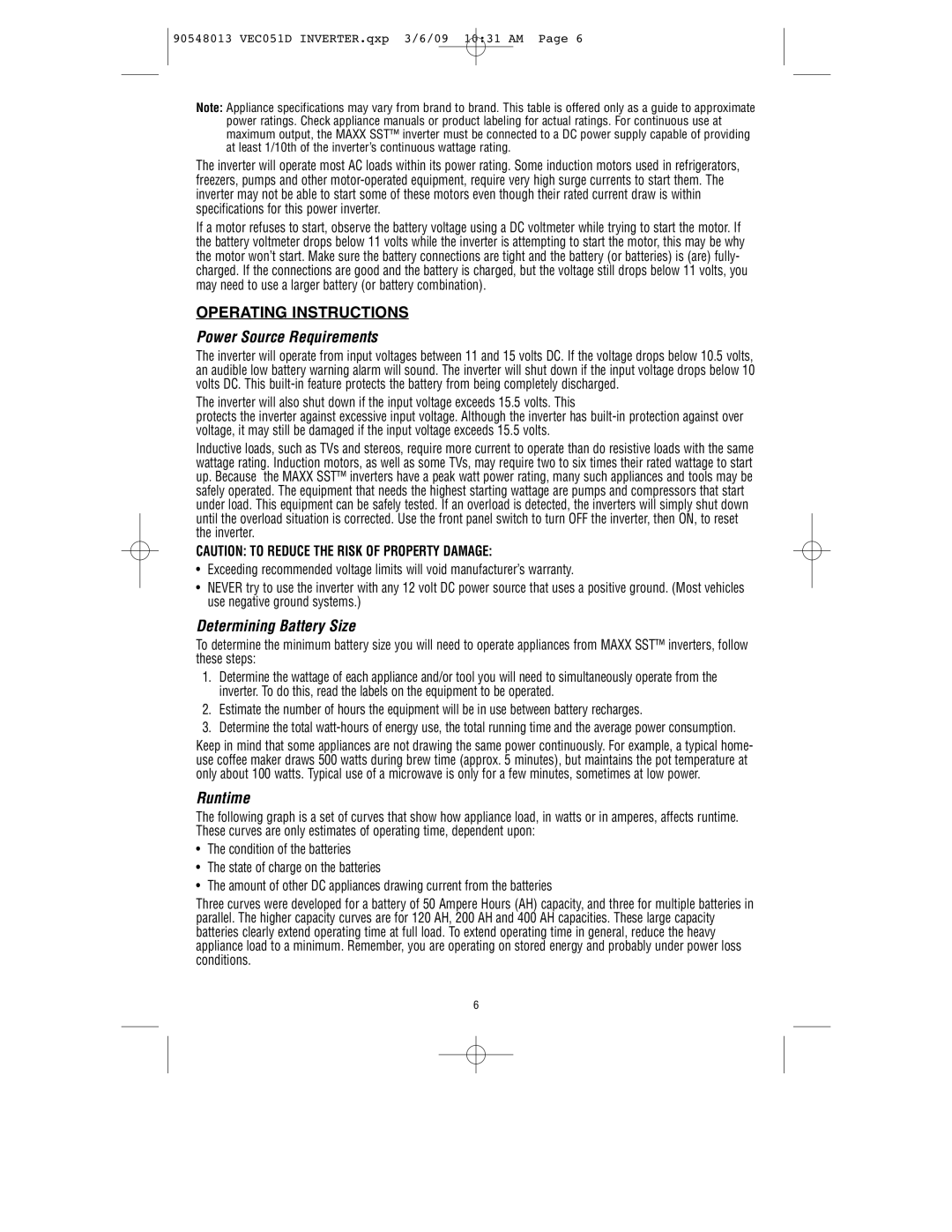
90548013 VEC051D INVERTER.qxp 3/6/09 10:31 AM Page 6
Note: Appliance specifications may vary from brand to brand. This table is offered only as a guide to approximate power ratings. Check appliance manuals or product labeling for actual ratings. For continuous use at maximum output, the MAXX SST™ inverter must be connected to a DC power supply capable of providing at least 1/10th of the inverter’s continuous wattage rating.
The inverter will operate most AC loads within its power rating. Some induction motors used in refrigerators, freezers, pumps and other
If a motor refuses to start, observe the battery voltage using a DC voltmeter while trying to start the motor. If the battery voltmeter drops below 11 volts while the inverter is attempting to start the motor, this may be why the motor won’t start. Make sure the battery connections are tight and the battery (or batteries) is (are) fully- charged. If the connections are good and the battery is charged, but the voltage still drops below 11 volts, you may need to use a larger battery (or battery combination).
OPERATING INSTRUCTIONS
Power Source Requirements
The inverter will operate from input voltages between 11 and 15 volts DC. If the voltage drops below 10.5 volts, an audible low battery warning alarm will sound. The inverter will shut down if the input voltage drops below 10 volts DC. This
The inverter will also shut down if the input voltage exceeds 15.5 volts. This
protects the inverter against excessive input voltage. Although the inverter has
Inductive loads, such as TVs and stereos, require more current to operate than do resistive loads with the same wattage rating. Induction motors, as well as some TVs, may require two to six times their rated wattage to start up. Because the MAXX SST™ inverters have a peak watt power rating, many such appliances and tools may be safely operated. The equipment that needs the highest starting wattage are pumps and compressors that start under load. This equipment can be safely tested. If an overload is detected, the inverters will simply shut down until the overload situation is corrected. Use the front panel switch to turn OFF the inverter, then ON, to reset the inverter.
CAUTION: TO REDUCE THE RISK OF PROPERTY DAMAGE:
•Exceeding recommended voltage limits will void manufacturer’s warranty.
•NEVER try to use the inverter with any 12 volt DC power source that uses a positive ground. (Most vehicles use negative ground systems.)
Determining Battery Size
To determine the minimum battery size you will need to operate appliances from MAXX SST™ inverters, follow these steps:
1.Determine the wattage of each appliance and/or tool you will need to simultaneously operate from the inverter. To do this, read the labels on the equipment to be operated.
2.Estimate the number of hours the equipment will be in use between battery recharges.
3.Determine the total
Keep in mind that some appliances are not drawing the same power continuously. For example, a typical home- use coffee maker draws 500 watts during brew time (approx. 5 minutes), but maintains the pot temperature at only about 100 watts. Typical use of a microwave is only for a few minutes, sometimes at low power.
Runtime
The following graph is a set of curves that show how appliance load, in watts or in amperes, affects runtime. These curves are only estimates of operating time, dependent upon:
•The condition of the batteries
•The state of charge on the batteries
•The amount of other DC appliances drawing current from the batteries
Three curves were developed for a battery of 50 Ampere Hours (AH) capacity, and three for multiple batteries in parallel. The higher capacity curves are for 120 AH, 200 AH and 400 AH capacities. These large capacity batteries clearly extend operating time at full load. To extend operating time in general, reduce the heavy appliance load to a minimum. Remember, you are operating on stored energy and probably under power loss conditions.
6
